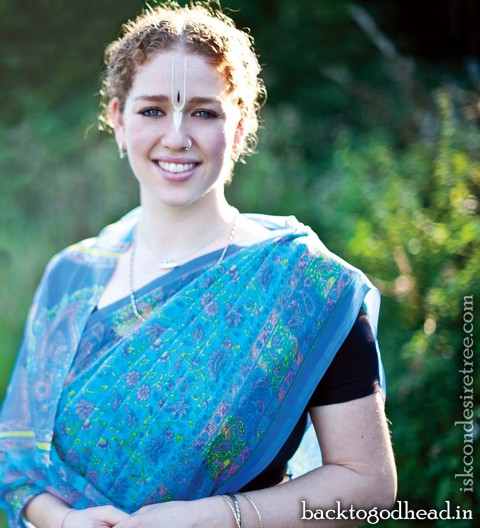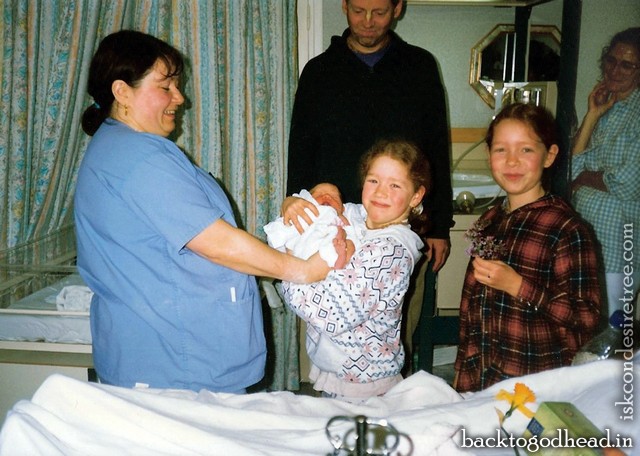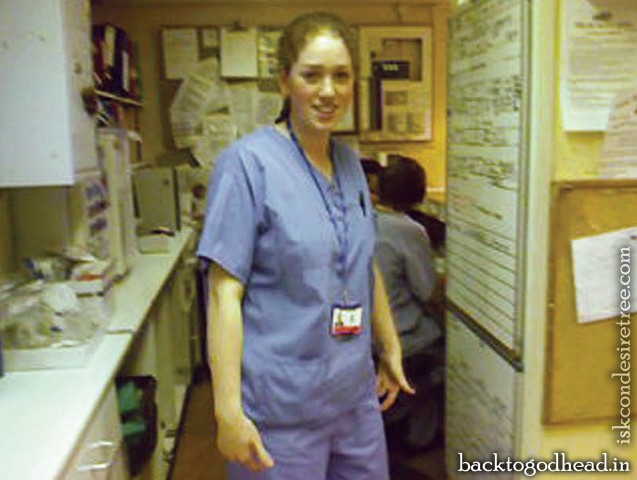A young devotee finds joy and spiritual realization as she pursues a career as a midwife.
Tulasi Harrison was only seven years old still practically a baby herself when she decided she wanted to become a midwife and help bring new life into the world. Tulasi grew up in the ISKCON community at Bhaktivedanta Manor in England, daughter of priest and congregational preacher Kripamoya Dasa and gurukula teacher Guru Carana Padma Dasi. Her little brother Mali was fortunate enough to be delivered by a devotee midwife, her mother’s friend Ramadevi.
As she came to say hello to Mali after the birth, Tulasi looked up at Ramadevi in awe.
“I thought it was just so amazing that someone who was both your friend and a devotee could deliver your baby," says Tulasi, now twenty-one.
Inspired, Tulasi kept the thought in her mind over the years. She considered other caring jobs such as nurse or teacher, but when she got to college at eighteen, everything fell into place for her to become a midwife.
With her chosen goal-a Bachelor of Science degree at London's City University-Tulasi was in for a busy, challenging, and rewarding three years. She explains that in the UK, the role of midwife is a very prestigious, highly skilled, and well-paid government job. Although capable of doing natural home births, midwives in the UK, unlike those in the US, generally work at hospitals alongside the doctor and are present throughout all births, as advocates for the mother.
To learn such a specialized skill, Tulasi spent forty percent of her time at her university learning theory and academic knowledge, and sixty per cent at the University College Hospital in the heart of London, getting practical training and experience.
Her hectic schedule, whizzing back and forth between both locations every few weeks, was a challenge to her still developing commitment to Krishna consciousness-but Tulasi was determined to do her best at balancing the two.
Balancing Work And Krishna Consciousness
"On days when I was at the hospital, I would have to leave home at 6:45 A.M., start work at 8:00 A.M., and, depending on my shift, stay until 8:30 P.M. or even later," Tulasi says. "A few times when it was too late to go home safely, I even had to spend the night at the hospital."
Tulasi is honest about what a struggle it was for her to fit saddhana, regulated spiritual practices, into her day.
"It's tough to fit chanting japa in, what to speak of the morning program at the temple, when you're doing a twelve- or fourteen-hour shift," she says. "Sometimes I would get up at the latest time I could, because I was just so tired. The stressful and emotionally draining nature of the job made it even more difficult."
Still, Tulasi's outlook was to see her Krishna conscious practices as a source of strength, rather than as a burden. During the twenty-minute walk from her train station to the hospital in the morning, she would chant on her beads. And at the hospital, she searched for and found a quiet, peaceful prayer room, where she would chant during her one-hour lunch break.
Meanwhile, Tulasi protected herself from the student lifestyle of drinking and clubbing by living at home with her family rather than on campus, by choosing the right association, and by keeping herself busy with Krishna conscious activities in the little spare time she had.
"Support systems are very important," she says. "For me, my sister, Jahnavi, is one of my biggest inspirations, and when she was there I felt safe. Having a lot of devotee friends, especially ones who had similar challenges to mine, was also very helpful. I got on well with the people in my course, but the bond I have with devotee friends is so much deeper, because they understand so much more about my life and faith."
On the weekends, Tulasi would do service at the temple, have bhajanas with other gurukulis, perform dramas at temple festivals, volunteer with the Pandava Sena youth group, and take classes in Bharatnatyam dance. Then she would dive right back into her course during the week.
"I don't think I got much sleep!" She laughs.
Understanding That Krishna Is in Control
While she trained to become a midwife, Tulasi delivered four more than the required forty babies, and participated on some level in hundreds more births at the post-natal ward in the University College Hospital's delivery suite, at the birthing center, and at special pools for pool births.
"I started off just observing and helping a senior midwife," Tulasi says. "Then I put my hands on hers while she was delivering the babies. Finally, as I became more experi-enced, I started doing the deliveries and all the paperwork afterwards myself."
According to Tulasi, the work required a strong stomach-new students often fainted at the sight of blood-but she thrived in such a challenging environment. Her Krishna conscious upbringing helped her to understand things at a deeper level than most, while the setting was also ripe for spiritual realizations.
One of the greatest realizations for Tulasi in her training was that while she could do her best and put all her medical skills to use, at the end of the day everything was under Krishna's control, not hers. So when something wasn't going right, she simply surrendered and prayed to Him to help the mother and child, which often yielded amazing results.
"Once the umbilical cord had wrapped around a baby's neck, and it was so tight that her face was white-a very bad sign," Tulasi says. "I knew that it was dangerous to cut the cord before the baby came out, because she could get stuck inside, but it was also the only way to save her. So I prayed to Krishna, and then made the difficult decision to cut the cord. by Krishna's mercy, she came out, I rushed her off to the doctors, and she was fine."
Of course, things didn't always go well. Sometimes there were miscarriages, or still-births. But when tragedy struck, understanding that it was the will of God helped Tulasi to be there for the family, as well as to deal with doubts about whether she could have done something more to prevent it.
"Atheists have told me that they don't need religion, and that it's just a crutch for people to lean on," Tulasi says. "But I say yes, it is a crutch, and what's wrong with that? It's not that atheists are strong and we are weak. It's that we understand that we're weak, as human beings with material bodies. And we need Krishna as a source of strength in difficult times."
Tulasi felt a deep connection with patients who were also God conscious and had the same understanding, while other mothers would notice that she had a special quality about her.
"Wow, you're so calm," they would say. "Whenever you come into the room, I just feel peaceful." Some requested her specifically, saying, "We like the way she is."
In helping couples through the often difficult experience of giving birth, and providing emotional support for them through all kinds of complications and situations, Tulasi found that she formed strong bonds with them in short periods of time.
"As a midwife, you have to be strong for both parents when they're scared and worried," she says. "You have to put them at ease, so that they feel completely comfortable with you. You become like their best friend. By the time the birth has happened, they love you so much. And then it's time to say goodbye. You just have to end the relationship right there. It can be difficult."
The Gift of a Lifetime
Before a new family went home, however, Tulasi would make sure she always chanted the Hare Krishna mantra in the newborn baby's ear while weighing it or doing some other task.
"I didn't know what kind of life they were going to have, but I just wanted them to have heard Krishna's name, and hopefully to remember it at some point in the future," she says. "It's just a gift I wanted to pass on to every baby before they embarked on the journey of life."
Tulasi also gave the gift of Krishna consciousness to the adult patients and hospital staff. Since she was very popular at the hospital because of her caring, bright, and happy nature, which she attributes to her Krishna conscious up bringing, people would ask her why she was always so happy, or where she got her unusual name. When she told them she was a Hare Krishna, their reaction would often be surprise.
"Working as a midwife is an excellent opportunity for me to tell people about Krishna consciousness and clear up any misconceptions they may have had about it," she says. "I found myself having long conversations about the philosophy with mothers, other midwives, and even doctors, explaining to them what it is that makes me so happy and peaceful."
"You Have the Highest Service"
In December 2010, after completing her midwifery course, Tulasi opted to take some time out before getting a job in her chosen career. She decided to spend it taking a three-month course for a Bhakti-sastri degree in Srila Prabhupada's books in the holy dhama of Mayapur, India.
"For those of us who grew up in a devotee family, the philosophy is ingrained in us, but often it's at the level we learned as kids in gurukula, and we don't study more as adults," she says. "At least I didn't," she adds with her trademark honesty. "So I wanted to balance my education as a midwife with a stronger knowledge of Krishna consciousness."
Krishna seemed to reciprocate by giving Tulasi a chance to directly connect her career to Him. For it was while in the holy dhama that she assisted in her first ever devotee birth.
"I discovered that Ramadevi, who first inspired me to be a midwife, was living in Mayapur and doing midwifery there," she says. "And I got a chance to assist her in a birth. It was just an amazing experienceit was my first birth since qualifying as a midwife, my first devotee birth, my first birth in a holy place, and my first birth assisting my original inspiration, Ramadevi."
For Tulasi, delivering a baby at someone's house in Mayapur was an entirely new experience. She had never done a home birth before, and the nearest hospital was half an hour away, with a car waiting to rush there in case of complications. What's more, there was less equipment than was available at home births back in England. And there were no doctors to help in case of an emergency.
"Ramadevi and I were completely on our own, and I remember thinking, 'Oh my God, this is so much responsibility-if anything happens to this baby, it's all my fault,'" Tulasi says. "We had to formulate our plan in case of an emergency, and then just rely on Krishna."
This faith in the Lord was the one thing everyone had plenty more of in Mayapur than back in England, and it guided them through the task.
"At one point, as we were really struggling, Ramadevi looked up at the couple's Jagannatha deities," says Tulasi. "She said, 'We all have to pray to Lord Baladeva, who is the force of gravity, to help us pull this baby out, just as he once pulled the Yamuna River to Him.' We all prayed, and immediately the contractions became stronger, and the baby started coming out. It was amazing."
At that moment, Tulasi remembered what ISKCON Mayapur's head priest Jananivasa Dasa had once told Ramadevi: "You have the highest service, because you get to touch the feet of the dhama-vasis [residents of a holy place] before they even touch the ground."
These words running through her head, Tulasi placed the baby's feet on her head, and then handed her gently to her mother.
All the while, a recording of Prabhupada singing kirtana played in the background, and everyone present chanted the holy names of Krishna.
Ramadevi told everyone, "There's nothing more special than delivering a devotee into this world to the sound of kirtana, with Prabhupada singing and devotees surrounding the child."
"We all got quite choked up at that," Tulasi recalls. "It was such a wonderful thought. The birth of a devotee is an addition to our big, worldwide family, and is always such a special, heartfelt moment. And this one certainly was. It was such a celebration! Throughout the labor, the father had been cooking a huge prasadda feast, and many devotees gathered to honor it and to give the new baby their blessings."
The Future
After spending six months in Mayapur, Tulasi returned to England, where she is now applying for a job. Her stay in Mayapur has renewed her determination to make Krishna the center of her life.
"For me, besides chanting and attending the temple morning program more, that means taking steps to arrange my work to bring me closer to Krishna by serving His devotees," she says. "So I've applied for a job at Watford General, the hospital near Bhaktivedanta Manor where my brother was born, and where many other devotee babies continue to be born."
In the future, Tulasi hopes to return to India to help Ramadevi deliver babies in Mayapur and the surrounding villages. There, she may co-author a book with Radha Sundari Dasi about Vaishnava mothers and their experiences of giving birth and raising their children. She also plans to study samskaras (traditional Vedic or Vaishnava rites, which Radha-Sundari Dasi teaches), as well as Ayurveda and other Vedic sources regarding pregnancy and birth, so that she can provide a more spiritual, holistic alternative to modern advice on childbearing.
Finally, setting up her own clinic is a long-term future goal for Tulasi. "I'd like it to be a place where devotees can come and have a more Krishna conscious experience, and feel completely comfortable," she says. "I'm looking forward to it. This is such a sweet, rewarding service to have."
Madhava Smullen, raised in a devotee family, writes for news.iskcon. com. This article was originally published there, and he expanded it for ETG. Other articles about devotees are posted weekly on news. iskcon. com. Madhava lives in Alachua, Florida, USA, and in October married Manjari Gauthier, also from a family of devotees.



